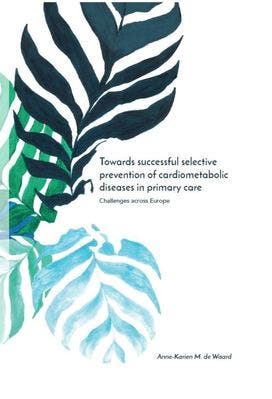Anne Karien de Waard
Towards successful selective prevention of cardiometabolic diseases in primary care. Challenges across Europe

- Datum
- (Co) promotoren
- 04-12-2018
- prof.dr. N.J. de Wit, prof.dr. F.G. Schellevis, dr. M. Hollander, dr.ir. J.C. Korevaar
Samenvatting
Cardiometabolic diseases (CMD), including cardiovascular disease, diabetes mellitus and chronic renal failure are presently the leading cause of mortality worldwide. Since around 80% of cardiovascular diseases and over 90% of diabetes could be prevented or postponed by improving lifestyle alone, there is a large window of opportunity to prevent these diseases. Selective prevention targets at asymptomatic persons at high risk of CMD, including interventions to lower their risk and seems a promising strategy to prevent CMD. However, implementation in clinical practice is challenging and despite its importance, currently there is no European Union (EU) wide policy for selective prevention of CMD. More insight in current practices in different countries could help to find best practices, as well as barriers and facilitators for selective prevention of CMD. This provides the opportunity for countries to learn from each other’s experiences and to provide recommendations on how to optimise CMD prevention across Europe. In this thesis we assessed the following research objectives: 1.Health care system level: To provide information on the current status of the implementation of health checks for CMD across Europe and on conditions to facilitate the implementation; 2.Health care provider level: To give more insight in the current activities and barriers and facilitators for general practitioners (GPs) to invite their patients for a CMD health check, as well as their attitude towards selective prevention of CMD; 3.Population level: To examine willingness of the target population to participate in a health check for CMD as well as barriers and facilitators for participation. The results in this thesis showed that in almost two-third of the countries in the EU a selective prevention programme for CMD is available. When studying five countries in more detail (the Czech Republic, Denmark, Greece, the Netherlands and Sweden), we conclude that although most GPs consider selective CMD prevention as useful, it is not universally implemented, with differences in GPs’ activities between and within countries. We identified several facilitating and obstructing factors for GPs to undertake selective prevention of CMD. On population level, we conclude that most individuals are willing to participate in a CMD health check, and we identified facilitating and obstructing factors for individuals to participate in health checks. For successful implementation of selective prevention in general practice, changes on the level of the health care system, health care provider and population are essential. In short, GPs could play an important role in selective prevention of CMD, which asks for a formalisation of the role of GPs, adequate reimbursement and time to perform preventive activities. On the level of the population the optimal target population should be defined, as well as an optimal method to invite the target population for selective prevention programmes for CMD. A focus on prevention and the political willingness to invest and structurally fund prevention activities is thereby important. The EU could play an important role by making prevention programmes for CMD a political priority across Europe. Further research should focus on how to best implement selective prevention programmes for CMD in the different countries, in relation to their cost-effectiveness.
